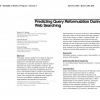Free Online Productivity Tools
i2Speak
i2Symbol
i2OCR
iTex2Img
iWeb2Print
iWeb2Shot
i2Type
iPdf2Split
iPdf2Merge
i2Bopomofo
i2Arabic
i2Style
i2Image
i2PDF
iLatex2Rtf
Sci2ools
106
click to vote
CHI
2009
ACM
2009
ACM
Predicting query reformulation during web searching
This paper reports results from a study in which we automatically classified the query reformulation patterns for 964,780 Web searching sessions (composed of 1,523,072 queries) in order to predict what the next query reformulation would be. We employed an n-gram modeling approach to describe the probability of searchers transitioning from one query reformulation state to another and predict their next state. We developed first, second, third, and fourth order models and evaluated each model for accuracy of prediction. Findings show that Reformulation and Assistance account for approximately 45 percent of all query reformulations. Searchers seem to seek system searching assistant early in the session or after a content change. The results of our evaluations show that the first and second order models provided the best predictability, between 28 and 40 percent overall, and higher than 70 percent for some patterns. Implications are that the ngram approach can be used for improving search...
CHI 2009 | Human Computer Interaction | Query Reformulation Patterns | Query Reformulation State | Technology The Pennsylvania |
Related Content
| Added | 24 Nov 2009 |
| Updated | 24 Nov 2009 |
| Type | Conference |
| Year | 2009 |
| Where | CHI |
| Authors | Bernard J. Jansen, Danielle L. Booth, Amanda Spink |
Comments (0)

